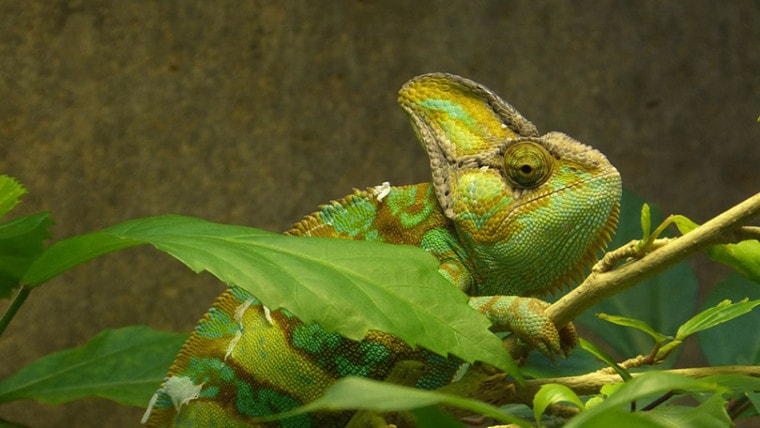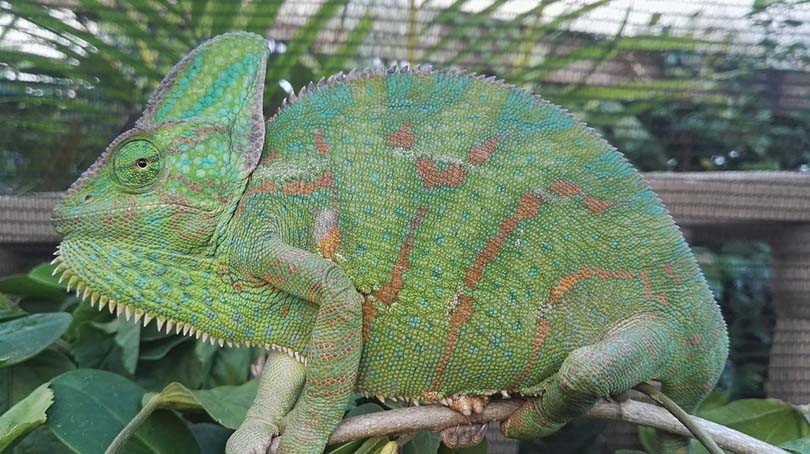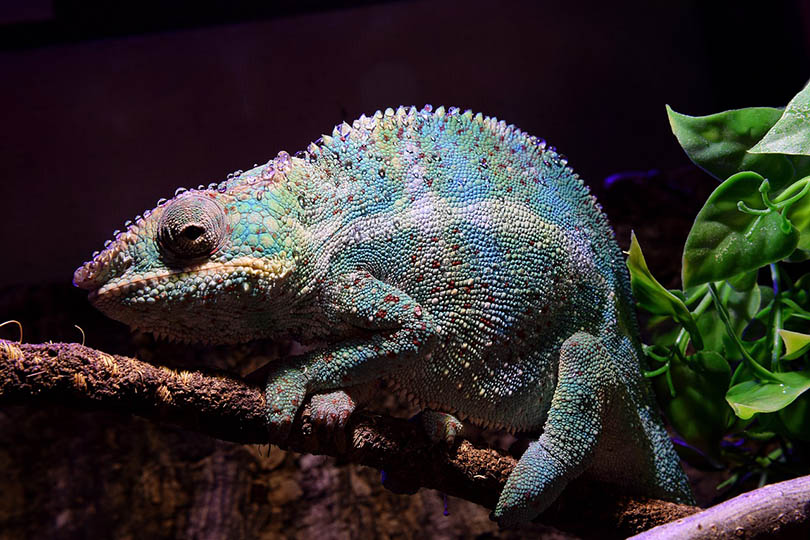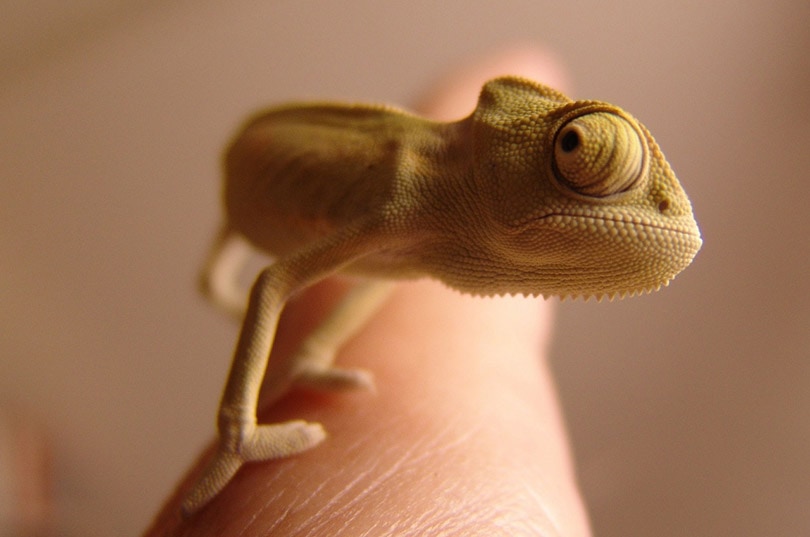
Pet Keen advocates for adopting before shopping. We understand there are many reasons for seeking a breeder, though, so we encourage it to be done the right way. We have not personally investigated all of the breeders below, rather, we have gathered their details for you to get in touch and ask all the right questions before you decide. Learn more about our position and how to choose a breeder here.
Chameleons make great pets. They’re interesting, low-maintenance, and constantly full of surprises.
Getting your hands on one, on the other hand, can be quite the challenge. While you can always just pop into your local pet store and buy one there, you have no idea what kind of quality pet you’ll be getting. Pet store chameleons are notorious for being prone to disease, and that’s not even taking into account the possible moral issues that go along with supporting such practices.
If you want a quality pet from a source that you can trust, you’ll need to go through a breeder. If you live in the U.S.A., the breeders on this list are your best bet for finding a chameleon that will stick around for quite some time.
Chameleons Breeders in the U.S.A.

It’s essential to find a reputable breeder if you want the best possible chameleon that you can get. Many people rely on other avenues, such as going through pet stores, Facebook, or friends, and then these same people wonder why it’s so hard to find a healthy chameleon that lives anywhere near its intended lifespan.
Unfortunately, trustworthy chameleon breeders aren’t quite as easy to find as, say, trustworthy Golden Retriever breeders. That said, there are several in the United States that enjoy a well-deserved sterling reputation.
You may have to travel a bit to interact with a good breeder, though there are some on this list that can ship your new pet to you. Regardless, we feel it’s much more likely that you’ll get a chameleon that’s worth your money from the options on this list than anywhere else in the country.
Chameleons Breeders Near Me
Chameleons Breeders That Ship
Chameleons Rescue
How Much Does a Chameleon Cost?

The cost of a chameleon will vary depending on a few factors, including their specific breed, size, and color. Larger lizards tend to be pricier, as do those that boast rare or particularly stunning patterns.
If you’re purchasing from a reputable breeder, you can expect to pay anywhere from $200 to $600 for a chameleon (not including shipping costs). This includes the cost of breeding the reptile and providing it with necessary medical care in the first few weeks of its life. Many breeders also offer some sort of health guarantee on their reptiles, which further drives up the price.
You can likely find cheaper chameleons in chain pet stores, but those animals will be less likely to come from premium stock or have access to medical care, and it’s unlikely that you’ll be given any sort of guarantee as to the health of the reptile.
Things to Ask a Chameleon Breeder

There are a few questions that you should ask a breeder before buying from them, to ensure that they actually know their stuff. In particular, we recommend asking the following.
How Old Are Your Chameleons at the Time of Sale?
Breeders will sell chameleons when they’re as young as 3 weeks old, but it’s best to wait until they’re at least 5 weeks old. This allows the animal to grow a bit and gives the breeder more time to evaluate its overall health.
Some pet stores and breeders will also sell you reptiles that are quite old (meaning, 6 years old or more). Unless they’re clear on the animal’s age and are willing to give you a discount, this should be a red flag. Of course, if you’re rescuing a chameleon, they can be any age at all.
Most importantly, though, refuse to do business with a breeder that can’t tell you a chameleon’s age.
Was the Chameleon Bred in Captivity?
Captive-bred chameleons are much more docile and easier to raise, whereas wild-caught chameleons are more likely to suffer from parasites that could affect their quality of life, shorten their lifespan, and force you to drop a bundle on medical care. Unless you’re an experienced reptile owner, stick with captive-bred animals.
Can You Inspect the Animal Before Buying?
There are certain telltale signs that a chameleon is unhealthy, such as a weak grip or breathing through its mouth. A reputable breeder should allow you to thoroughly inspect the chameleon before you buy to ensure that you get a healthy reptile. If the breeder refuses to let you look at the lizard, it’s a big red flag.
Just as important as what you ask the breeder is what the breeder asks you. They should determine that you know the level of care that your chameleon will need and that you can provide it with the time and space that it needs to thrive. If they don’t ask you any such questions, it’s a sign that they don’t care about their animals.
The 3 Things to Know Before Buying a Chameleon

1. They Need Plenty of Gear
You can’t just throw a chameleon into a regular aquarium and expect it to thrive. These animals need specialized housing — preferably, giant terrariums that are taller than they are long — and plenty of accessories.
They need branches, plants, and other decorations that they can climb on and blend in with, and they prefer to be situated high up so they can keep a lookout on their surroundings. They also need heat, lighting, humidity gauges, and misters.
This drives up the cost of owning one of these animals, and it also makes them more difficult to care for than many people anticipate.
2. They’re Not Going to Fall in Love with You
Chameleons aren’t warm and cuddly animals. They may trust you enough to climb on you and inspect you, but if you want an animal that will snuggle up to you at night, get a dog instead.
For the most part, chameleons prefer to keep to themselves, and they don’t care for being handled. This is a pet that you sit and watch, not one that you pull out to play with.
3. Maintaining the Cage Can Be a Grind
Chameleons need live food, so you have to serve them gut-fed worms, crickets, or the like. However, they don’t always eat all the food you serve them, and you’ll need to remove dead or uneaten prey before it starts to stink up the joint or pose a threat to your reptile.
They also don’t really drink from water bowls, preferring instead to slurp condensation off leaves and other plants. That means you’ll need to mist the cage every day, and that means that mold and mildew can be a problem.
You have to remove poop and other messes daily, and every week, you need to remove everything from the terrarium to give it a thorough cleaning.
Conclusion
While chameleons can be fascinating and satisfying pets, they’re not for everyone. Tracking down a healthy reptile can be expensive and time-consuming, and taking care of one of these lizards once you bring them home isn’t a walk in the park either.
That said, owning a chameleon is well worth it. They provide endless amounts of entertainment, and they’re incredibly fun to look at.
Featured Image Credit: Harald Matern, Pixabay









